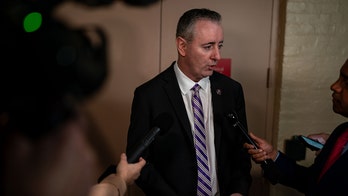Ohio voters to decide on marijuana legalization
Marijuana legalization for medical and recreational use on the ballot
Smoking pot could soon be legal in Ohio, with or without a prescription.
Ohio voters are going to the polls Tuesday to vote on whether to make marijuana legal for both medicinal and commercial purposes, the first time both questions have been on any state ballot at once.
The ballot question is one of many hot-button initiatives being put to voters in states across the country on Tuesday, for an off-year election where local issues -- not presidential politics -- are topping the agenda.
Ohio's pro-pot "Issue 3" item has sparked huge political battles and made the Buckeye State ground zero for the cannabis controversy.
"We spend all our time trying to tell kids to stay off drugs, and to legalize this drug sends such a mixed message," said Ohio Gov. John Kasich, a Republican presidential candidate and one of the initiative's biggest foes. "We can't afford mixed messages to our kids. So I'm totally opposed to this."
But voters could approve the initiative over his opposition, joining states like Washington and Colorado.
About 800,000 people signed petitions to put "Issue 3" on the ballot. While legalizing pot already is divisive, what makes "Issue 3" even more controversial is that it would create an oligopoly for weed producers and distributors.
The initiative restricts the Ohio marijuana market to just 10 licensed farms which would have control of production and distribution for the whole state. Those who own the coveted licenses could then set prices and probably make considerable cash selling.
And the list of license holders reads like a who's-who of famous Ohioans, including NBA legend Oscar Robertson, NFL journeyman Frostee Rucker and former 98 Degrees star Nick Lachey. They're the same group helping fund the initiative.
Ian James, executive producer of ResponsibleOhio, the political action committee behind "Issue 3," explained that the reason for the short list of license holders is to gain quality control over the drug.
"We know who's going to be growing. We know where it's going to be grown. We require that there be regulation on whatever is grown, that there be testing of it, that the consumers know what they're consuming," James said.
Further, supporters claim "Issue 3" would take the profits away from drug dealers and shift them to regulated growers who then would have to pay taxes on what they earn.
But opponents not only worry about marijuana proliferating as a gateway drug, but also about how "Issue 3" would affect companies.
"It's about how it's going to impact the workplace because employers would be mandated to let certain employees use it in the workplace," said Andrew Doehrel, head of the Ohio Chamber of Commerce and a member of Ohioans Against Marijuana Monopolies. "Do you want to be working next to someone that might be under the influence of marijuana?"
When it comes down to those who are for it and those who are against it, "There's a generational divide," said Ohio State University political analyst Paul Beck. "Younger people are more accepting of it than older people."
To get younger people to the polls, ResponsibleOhio created a mascot known as "Buddie" who unsurprisingly looks like a bud of marijuana. Buddie traveled to college campuses across the state registering students to vote.
But even if "Issue 3" passes Tuesday, the effort to legalize pot might still go up in smoke, because "Issue 2" is also on the ballot. "Issue 2" is an anti-monopoly amendment written by state lawmakers to counter the oligopoly of the marijuana bill.
The final word on weed could come from the state Supreme Court. If both the anti-monopoly "Issue 2" and the pot legalization "Issue 3" pass, the court will have to decide which one stands.
Polls close Tuesday evening.





